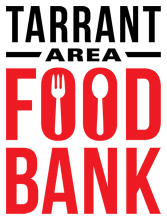The recent USDA announcement regarding the cancellation of state agreements for the
2025 Local Food Purchase Assistance Program (LFPA) and the Commodity Credit
Corporation (CCC) supplemental food purchases has created a substantial challenge
for the Tarrant Area Food Bank (TAFB). With a loss of $1.9 million in funding, equivalent
to 1.3 million meals from LFPA reductions and the cancellation of 39 truckloads of food
from CCC, TAFB now faces a significant shortfall of 2.5 million meals or $4.2 million.
These reductions affect the food available to food insecure families and place a strain
on TAFB’s resources as it works to continue supporting families, children, and seniors
facing hunger.
Despite these challenges, TAFB remains steadfast in its commitment to securing more
food and ensuring families in need continue receiving support. TAFB is actively
advocating for a strong Farm Bill in September 2025 to help local farmers and
growers, while providing ongoing assistance to families struggling with food insecurity.
Our advocacy includes:
- Continue Partnerships between U.S. Agriculture & Tarrant Area Food Bank
while Investing in Local and Regional Food Systems
a. Support for Local Agriculture & Sustainable Food Systems:
Encouraging policies that promote local farming and sustainable food
production can reduce dependency on imported goods, stabilize food
prices, and enhance food security.
b. Rescue Surplus Commodities: TAFB is working to recover surplus
commodities from trade negotiations, ensuring they are distributed through
food banks and hubs like the Sid W. Richardson Foundation Agricultural
Hub.
c. Excluding Staple Food Items from Tariffs: By removing tariffs on
essential food items, TAFB seeks to reduce food costs and prevent
additional strain on food assistance programs. - Support Federal Nutrition Assistance Programs through passage of a
strong Farm Bill and budget: Advocating for the passage of a strong Farm Bill
and supporting key programs like TEFAP, SNAP, and CSFP that help offset food
costs for low-income households.
a. Reauthorize & Strengthen the Emergency Food Assistance Program
(TEFAP), securing funding for food purchases from local farmers, storage,
distribution, and rural infrastructure to ensure ongoing support for food
banks.
b. Protect & Strengthen Supplemental Nutrition Assistance Program
(SNAP) by maintaining the purchasing power of SNAP, improving
enrollment processes, and connecting participants with employment and
training opportunities.
c. Reauthorize the Commodity Supplemental Food Program (CSFP) for
Seniors by ensuring seniors with low incomes continue receiving
nutritious food support.
Impact of Partnerships Between Agriculture & Food Banks: By connecting local
agriculture with food banks, TAFB is supporting both local farmers and producers, while
also addressing food insecurity. These partnerships are essential for strengthening
regional food systems, enhancing community support, and creating a positive feedback
loop that benefits local economies.





